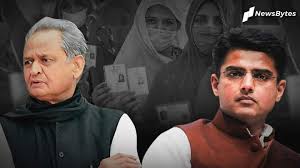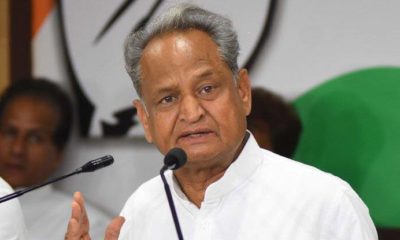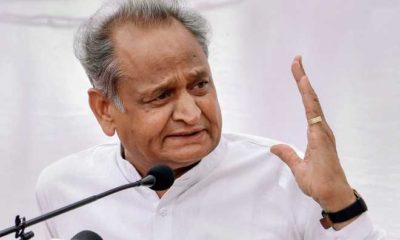Feature
Maharashtra move on madrassas contradicts PM’s vision: Congress

Mumbai: The Maharashtra government’s alleged move not to treat madrassas as schools in case they failed to teach primary subjects came in for criticism on Thursday from state party leaders of both the Congress and the Samajwadi Party.
The move was “diametrically contradictory” to Prime Minister Narendra Modi’s declared vision to bring Muslim youths into the national mainstream, said M. Naseem Khan, a Congress leader and a former minister for minority affairs.
“In the 2012 Gujarat assembly elections, modernisation of madrassas was included in the BJP’s election manifesto. Modi spoke about this in parliament. In the union budget for 2015-2016, the Centre allocated Rs.100 crore for this noble cause. Now, the Maharashtra government is talking like this,” he said.
“The government has not accorded them recognition; so where’s the question of derecognising them? Such statements will have no impact and the good education imparted in madrassas will continue unhindered,” said Khan while referring to the alleged move to “derecognise” approximate 1,900 madrassas across the western Indian state.
The ruling BJP-Shiv Sena government has decided to “derecognise” the madrassas in the state as formal schools since they only impart religious education.
Defending the move, state Education Minister Vinod Tawde said the government wants to bring in modern subjects in madrassas without interfering with the religious education.
“How is that anti-Muslim? We want to do this for their betterment… Under the Right to Education, children who aren’t taught under National School Curriculum are considered out of school,” Tawde said.
The move — on which Chief Minister Devendra Fadnavis has not commented so far — evoked a sarcastic response from Leader of Opposition Radhakrishna Vikhe-Patil: “Is it a decision taken in haste, or a well thought about decision?”
The move could deprive madrassas of funds for improvisation, unless they get affiliated to a formal board like the Maharashtra education board, Indian Certificate of Secondary Education or Central Board of Secondary Education and include subjects like science, maths and social studies in their curriculum.
“We have never asked for funds from them (government). We run madrassas purely on public charity … Besides Islamic teachings, we train them to be good human beings who shun all social-political evils to become good citizens of any country they belong to,” state Samajwadi Party president Abu Asim Azmi told IANS.
He pointed out that the Uttar Pradesh government recognises madrassa education and also gives them funding wherever required.
“Unfortunately, the BJP government in Maharashtra is attempting to divert public attention from a series of scams involving its ministers and trying to create insecurity in the minds of minorities around the country,” Azmi claimed.
Mumbai Congress president Sanjay Nirupam said the Fadnavis government’s move was an affront to the rights of the minorities and the party would challenge it in court and take up the issue in the coming state assembly session, while the state Congress has also slammed the move.
Questioning the wisdom behind the move, both — Khan and Azmi — pointed out that there were many examples in the country where madrassa-educated youths cracked top competitive exams like those for the civil services, IIT, IIM or other major professional and technical courses.
“During the Congress-NCP rule, we initiated the proposal to modernise madrassa education in the state. Instead of continuing the good work, the present BJP-Shiv Sena government is overturning it,” Khan said.
The issue has assumed significance in the backdrop of the demand for job and academic reservations for the Muslims and the recent anti-beef law.
Entertainment
Meghalaya Reserves Legalized Gambling and Sports Betting for Tourists

The State Scores Extra High on Gaming-Friendly Industry Index
Meghalaya scored 92.85 out of 100 possible points in a Gaming Industry Index and proved to be India’s most gaming-friendly state following its recent profound legislation changes over the field allowing land-based and online gaming, including games of chance, under a licensing regime.
The index by the UK India Business Council (UKIBC) uses a scale of 0 to 100 to measure the level of legalisation on gambling and betting achieved by a state based on the scores over a set of seven different games – lottery, horse racing, betting on sports, poker, rummy, casino and fantasy sports
Starting from February last year, Meghalaya became the third state in India’s northeast to legalise gambling and betting after Sikkim and Nagaland. After consultations with the UKIBC, the state proceeded with the adoption of the Meghalaya Regulation of Gaming Act, 2021 and the nullification of the Meghalaya Prevention of Gambling Act, 1970. Subsequently in December, the Meghalaya Regulation of Gaming Rules, 2021 were notified and came into force.
All for the Tourists
The move to legalise and license various forms of offline and online betting and gambling in Meghalaya is aimed at boosting tourism and creating jobs, and altogether raising taxation revenues for the northeastern state. At the same time, the opportunities to bet and gamble legally will be reserved only for tourists and visitors.
“We came out with a Gaming Act and subsequently framed the Regulation of Gaming Rules, 2021. The government will accordingly issue licenses to operate games of skill and chance, both online and offline,” said James P. K. Sangma, Meghalaya State Law and Taxation Minister speaking in the capital city of Shillong. “But the legalized gambling and gaming will only be for tourists and not residents of Meghalaya,” he continued.
To be allowed to play, tourists and people visiting the state for work or business purposes will have to prove their non-resident status by presenting appropriate documents, in a process similar to a bank KYC (Know Your Customer) procedure.
Meghalaya Reaches Out to a Vast Market
With 140 millions of people in India estimated to bet regularly on sports, and a total of 370 million desi bettors around prominent sporting events, as per data from one of the latest reports by Esse N Videri, Meghalaya is set to reach out and take a piece of a vast market.
Estimates on the financial value of India’s sports betting market, combined across all types of offline channels and online sports and cricket predictions and betting platforms, speak about amounts between $130 and $150 billion (roughly between ₹9.7 and ₹11.5 lakh crore).
Andhra Pradesh, Telangana and Delhi are shown to deliver the highest number of bettors and Meghalaya can count on substantial tourists flow from their betting circles. The sports betting communities of Karnataka, Maharashtra, Uttar Pradesh and Haryana are also not to be underestimated.
Among the sports, cricket is most popular, registering 68 percent of the total bet count analyzed by Esse N Videri. Football takes second position with 11 percent of the bets, followed by betting on FIFA at 7 percent and on eCricket at 5 percent. The last position in the Top 5 of popular sports for betting in India is taken by tennis with 3 percent of the bet count.
Local Citizens will Still have Their Teer Betting
Meghalaya residents will still be permitted to participate in teer betting over arrow-shooting results. Teer is a traditional method of gambling, somewhat similar to a lottery draw, and held under the rules of the Meghalaya Regulation of the Game of Arrow Shooting and the Sale of Teer Tickets Act, 2018.
Teer includes bettors wagering on the number of arrows that reach the target which is placed about 50 meters away from a team of 20 archers positioned in a semicircle.
The archers shoot volleys of arrows at the target for ten minutes, and players place their bets choosing a number between 0 and 99 trying to guess the last two digits of the number of arrows that successfully pierce the target.
If, for example, the number of hits is 256, anyone who has bet on 56 wins an amount eight times bigger than their wager.























